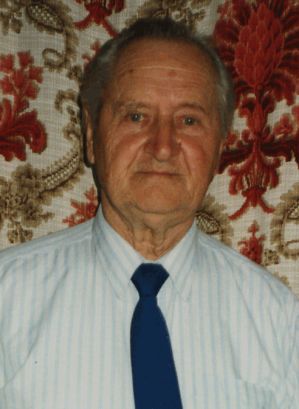
V.I.Siryi: I, Vasyl Siryi, was born in the regional center of Kodyma, Odesa Oblast. Earlier this town belonged to Podillia region, a few kilometers from the border with the Vinnytsia Oblast. The population of our regional center consisted mainly of Ukrainians, as well as small number of Jews and Poles. Almost homogeneous population. There I experienced all horrors of the Soviet system. Ever since childhood I remember the Holodomor, I remember very well the arrests when people were apprehended for nothing. It meant the extermination of the Ukrainian nation.
I was born on April 4, 1926 into a worker’s family. My father was Ivan Vasyliovych Siryi. From times immemorial in our family we had two combinations interchanging: Ivan Vasyliovych and Vasyl Ivanovych. I am proud of my father, because he was an independent and very hard-working man respected by our countrymen. He had a rugged life without a gleam of hope: the World War I, in which he participated, then collectivization set in. He escaped this campaign while working as a railroader. We lived near the station, he had good horses, it was a pity to donate them to the farm, and became a railroader working in a switching crew. Back then the cars were small: he put to them two horses and threw switches… And later he mastered the profession of carpenter. I do not remember what happened to those horses… He worked as a carpenter he was, so to speak, a professional carpenter. And my mother, of course, was a housewife.
V.O.: What are the years of his life his father and mother.
V.S.: My father was born in 1892 and my mother was born ten years later, in 1902. My father lived until 1973. At the time I had been already in jail and could not attend the funeral, it was such a tragedy. It’s, you know, many people had such feeling.
V.O.: What were your mother’s name and her maiden name?
V.S.: My mother’s name was Lebziak: in Kodyma many people have a name of Lebziak. Lebziak Liubov Petrivna and my father was Siryi Ivan Vasyliovych, he was born three kilometers from Kodyma in the Village of Ivashkiv. When he married my mother, they lived in Kodyma and they lived all their lives together. My mother died in 1992, here in this room, there was her small room, and we buried her over here.
My biography is as follows. From 1941 to 1944 I was on the occupied territory in Kodyma. There had been a change of invaders, i.e. the red invaders had expelled the brown invaders, expelled the invaders, and I was immediately called up for military service. In the army I served six and a half years. In the army I was in four branches of troops: at first I was sent for instruction courses where infantrymen were prepared for the front, but then came the commanding officers from a tank unit and ordered to the most talented and healthy infantrymen for the tank unit. I found myself among other selected infantrymen. It was a small group as compared with that division: it was a training division in the Ryazan Oblast, Siltsy in this known location they trained specialists for the front. From there I was transferred to the Horohovetsky tank camp. At the time they called them camps. There I passed out a full course.
Before send me to the front, it so happened that one tank that was called an “in-house manager”—it supplied water, firewood, its tower was removed